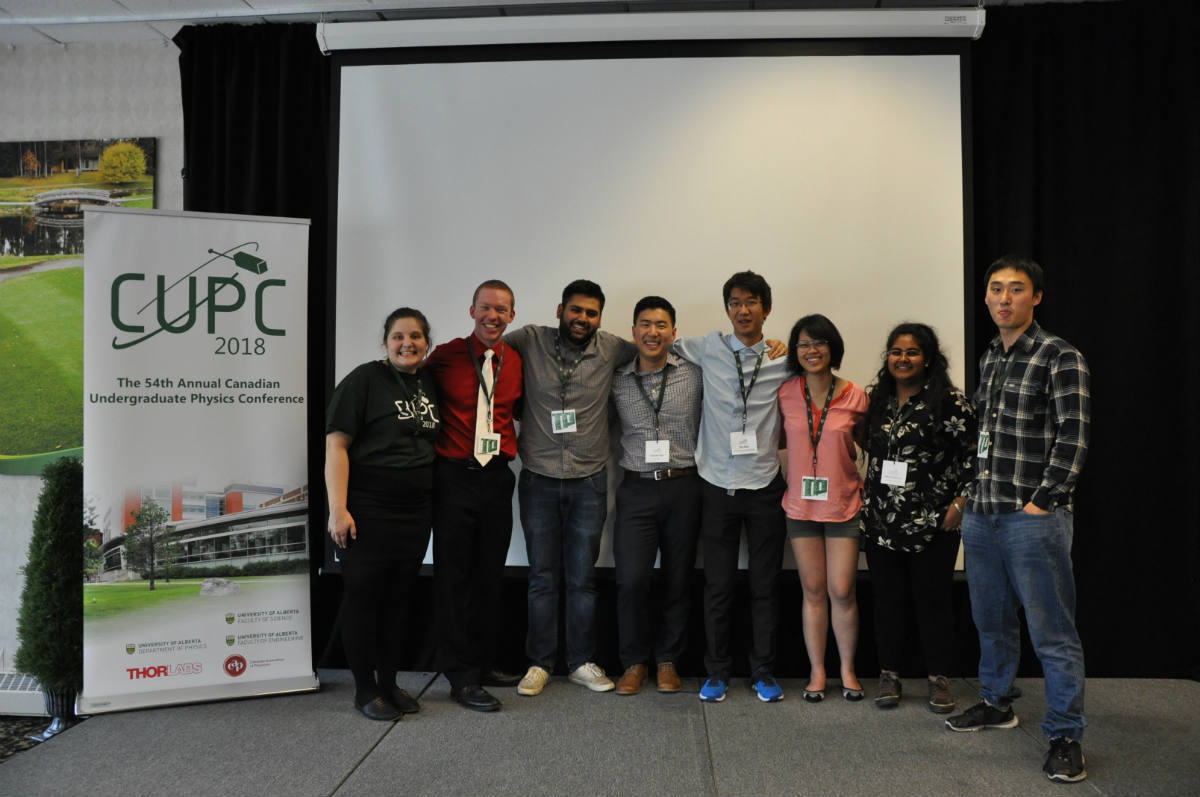
The undergraduate organizing committee of CUPC 2018. From left to right: Danielle Jenson, Tyler Zimmerling, Sahil Patel, Andrew Pyo, Zhi Han, Satchel Armena, Nitya Khetarpal, and Bo Leng.
The University of Alberta welcomed over 150 visiting undergraduate students to the 54th annual Canadian Undergraduate Physics Conference (CUPC) this month. Running from August 15th to 18th, the conference gave undergraduates the opportunity to present research, network with like-minded students, and hear from guest speakers that are leaders in their field. But not only was the CUPC a conference for undergraduates, it was organized by them as well.
Andrew Pyo and Tyler Zimmerling are undergraduate students studying engineering physics, who worked alongside six other undergraduates studying physics in the Faculty of Science and Faculty of Engineering to organize this year's conference. Pyo attended last year's CUPC at Carleton University, and was determined to bring the conference back west-something that hasn't happened since the conference was run at the University of British Columbia six years ago.
"My main motivation to become involved in organizing CUPC this year was to host the conference in Western Canada for the first time since 2012," said Pyo. "With so many strong undergraduate researchers in Western Canada, our goal was to make CUPC more accessible to those who want to share their work on a national platform."
Part of improving that accessibility meant rescheduling the conference, which has traditionally been held in October-right in the middle of midterms.
"I wasn't able to attend last year's CUPC with Andrew due to the timing of exams; that was one of the things we changed this year by hosting the conference in August," said Zimmerling. "In fact, the change has been so well-received that both groups bidding to hold the conference next year plan to hold the conference in August as well."
The conference provided a unique opportunity for undergraduate students, where attendees were invited to prepare posters and ten-minute presentations on research they've been involved with. For some, it was a chance to share with others what they've been working on over the past four years, while for others it was their first opportunity to get their feet wet by presenting findings.
John P. Davis, professor in the Department of Physics, helped support the undergraduate organizers with some of the logistics of running a large event on campus.
"This is a really unique conference, because it's organized by undergraduates, for undergraduates," said Davis. "Both of those are unusual things; often conferences are geared toward professors, graduate students, and their research. But this is a fantastic opportunity for undergraduate students to showcase what they've been working on."
Student-supported diversity
The undergraduate organizing committee made the decision to add an additional focus to this year's CUPC: women in physics and STEM careers, and encouraging traditionally underrepresented groups to attend the conference.
"The main motivation of this conference is to inspire young physicists towards a successful career that they will enjoy," said Zimmerling. "Part of that process is finding someone who you can relate to, or strive to be like. It's difficult to do that if you feel underrepresented; that's why we made it a priority to provide a mix of keynote speakers, as well as to find career panellists from different backgrounds."
That representation is something that's important, Davis agreed, for not only this conference but the sciences in general. This year's guest speakers, selected and scheduled by the students, included Mark Wise from CalTech, Stephanie Simmons from Simon Fraser University, Mark Van Raamsdonk from the University of British Columbia, and Lindsay LeBlanc from UAlberta's own Faculty of Science.
Steps to success
Hearing from guest speakers gave attendees an opportunity to connect with leaders in their field and hear about cutting-edge developments in physics. But giving undergraduates a chance to present research, hone their communication skills, and network with their peers, is just as important.
Davis, who is the lead of the Quanta CREATE program, which helps to train graduate students in emerging quantum technologies while developing skills required to succeed in industry as well as academia, sees the CUPC as an opportunity for undergraduates to bolster their skills and prepare for success.
"Having undergraduates stand up in front of their peers and hone their presentation skills makes this a great conference for attendees. But so does hearing other undergraduates' voices," said Davis. "There's something very powerful about seeing someone go up and give a great presentation who's also a person like you. A person who's also an undergraduate, or a person who's also a woman, or person who's not traditionally represented. Seeing someone succeed, who's like you, is a powerful reinforcement that you can also succeed."
The Canadian Undergraduate Physics Conference ran from August 15th to 18th at the University of Alberta. To learn more about the conference, including the research that the undergraduates presented, visit the CUPC 2018 website.